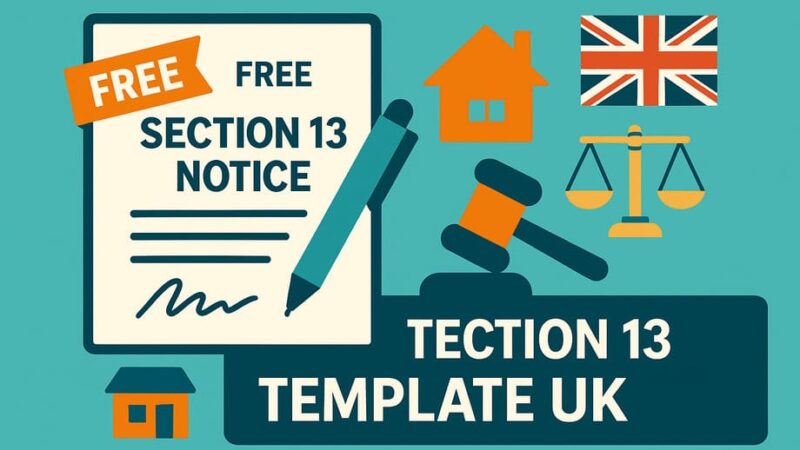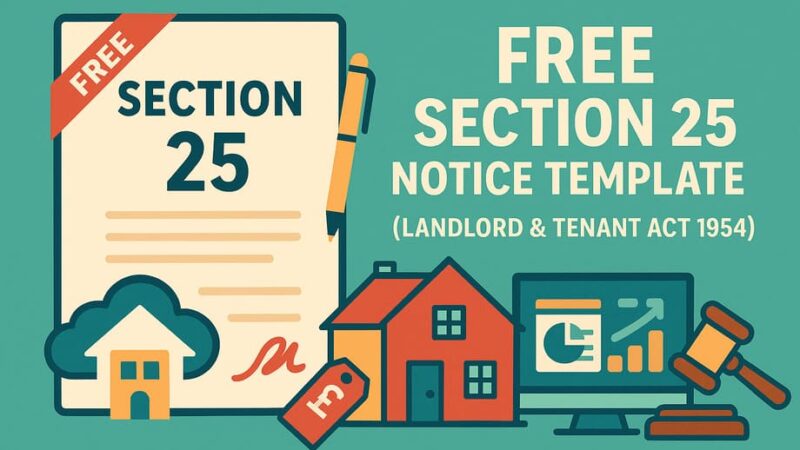Free Holiday Let Tenancy Agreement Template UK

Holiday let properties have become a major investment opportunity for UK landlords, driven by platforms like Airbnb and the growing demand for short-term accommodation. However, protecting your property and ensuring legal compliance requires the right agreement in place. Unlike standard tenancies, holiday lets need specialized contracts that clearly establish the temporary nature of the stay while protecting both owners and guests.
This comprehensive guide provides a free holiday let tenancy agreement template alongside essential information about legal requirements, what to include in your contract, and how to ensure compliance with UK regulations. Whether you’re renting out a countryside cottage, city apartment, or seaside property, having the right agreement prevents costly disputes and protects your investment.
What is a Holiday Let Agreement?
A holiday let agreement is a legal contract between property owners and guests for short-term accommodation stays, typically ranging from a few days to several weeks. Unlike traditional tenancy agreements, these contracts are designed specifically for temporary holiday purposes and fall outside the protection of the Housing Act 1988.
Key Characteristics of Holiday Let Agreements:
Holiday let agreements establish that guests are temporary occupiers without tenant rights, meaning they cannot claim long-term occupancy or protection against eviction. This distinction is crucial for property owners who need to maintain control over their investment and ensure quick turnaround between bookings.
The temporary nature of these agreements means guests pay for accommodation and services rather than rent in the traditional sense. This classification affects everything from legal rights to tax implications, making it essential to use the correct contract type for your situation.
Legal Framework and Protection
Holiday let agreements operate under contract law rather than housing legislation, providing property owners with greater flexibility and control. The agreement clearly states the commercial nature of the transaction and prevents guests from acquiring residential tenancy rights that could complicate property management.
This legal framework protects owners from situations where guests might attempt to extend their stay indefinitely or claim tenant protections. However, it also means the contract must be comprehensive and clearly written to ensure enforceability.
Why Holiday Let Agreement Templates Are Essential
The holiday letting market has experienced explosive growth, with hundreds of thousands of properties now operating as short-term rentals across the UK. This growth has created new opportunities but also new risks that proper agreements help mitigate.
Market Growth and Opportunities
Recent housing surveys indicate significant numbers of properties are now used for holiday letting, with coastal areas, national parks, and major cities seeing particular growth. This trend reflects both the potential profitability of short-term rentals and changing guest preferences for flexible, home-like accommodation.
The rise of remote working has further boosted demand, with digital nomads and extended-stay guests seeking properties that offer more space and amenities than traditional hotels. This creates opportunities for property owners but requires agreements that can handle varying guest needs and stay lengths.
Risk Management and Legal Protection
Without proper agreements, property owners face significant risks including property damage, extended unauthorized stays, disputes over deposits, and potential legal challenges from guests who might claim tenant rights. Professional agreements minimize these risks by establishing clear terms and expectations.
The commercial nature of holiday letting also creates specific insurance and liability considerations that standard tenancy agreements don’t address. Holiday let agreements include clauses that protect owners while ensuring guests understand their responsibilities and limitations.
Who Uses Holiday Lets in the UK?
Understanding your target market helps create agreements that address specific guest needs while protecting your interests. Holiday let users span a diverse range of demographics, each with different expectations and requirements.
Domestic Holiday Makers
Families and Groups Family groups represent a significant portion of holiday let guests, attracted by the space, privacy, and flexibility these properties offer compared to hotels. They typically seek properties in popular tourist destinations, coastal areas, and countryside locations that provide activities for different age groups.
Couples and Solo Travelers Romantic getaways and solo retreats drive substantial demand, particularly for unique properties like converted barns, historic cottages, or properties with special features. These guests often prioritize privacy, ambiance, and local experiences over basic accommodation.
Business and Extended Stay Guests
Corporate Travelers Business travelers, particularly those on extended assignments, increasingly choose holiday lets for the comfort and cost-effectiveness compared to hotels. These guests require reliable Wi-Fi, workspace areas, and professional environments that support their work needs.
Digital Nomads and Remote Workers The remote working revolution has created a new guest category seeking properties that function as temporary offices. These guests often book longer stays and require specific amenities like high-speed internet, comfortable workspaces, and quiet environments.
Event and Seasonal Visitors
Festival and Event Attendees Major events, festivals, and sporting occasions create concentrated demand for holiday accommodation. These guests often book well in advance and may have specific arrival and departure requirements that agreements need to accommodate.
Staycation and Weekend Break Guests Domestic tourism, particularly short breaks and staycations, represents consistent demand throughout the year. These guests typically book shorter stays but may return regularly, making them valuable repeat customers.
Do I Need a Holiday Let Agreement?
Yes, every holiday let booking requires a proper agreement to protect both parties and ensure legal compliance. The agreement serves multiple purposes beyond basic booking confirmation, creating enforceable obligations and protections that verbal arrangements cannot provide.
Legal Requirements and Compliance
UK law requires clear contractual arrangements for commercial accommodation, and holiday let agreements fulfill this requirement while distinguishing your property from residential lettings. This distinction prevents guests from claiming tenancy rights and ensures you maintain control over your property.
The agreement also demonstrates professional operation to insurance companies, local authorities, and tax authorities who may require evidence of proper business practices. Without formal agreements, you may face challenges proving the commercial nature of your operation.
Protection for Property Owners
Formal agreements protect against various risks including unauthorized extensions of stay, property damage beyond normal wear, disputes over deposits and charges, and liability claims for accidents or injuries on the property.
The contract establishes clear house rules, occupancy limits, and behavioral expectations that help prevent problems and provide recourse when issues arise. This protection becomes particularly important for high-value properties or those in areas with strict regulations.
Guest Protection and Clarity
Professional agreements also protect guests by clearly stating what’s included in their booking, establishing cancellation and refund policies, and providing contact information for support during their stay. This clarity reduces disputes and improves guest satisfaction.
Clear agreements help guests understand their responsibilities regarding property care, noise levels, and local regulations, creating better experiences for everyone involved.
What Should a Holiday Let Agreement Include?
A comprehensive holiday let agreement must cover all aspects of the booking while clearly establishing the temporary, commercial nature of the arrangement. Each section serves specific legal and practical purposes that protect both parties.
Essential Property and Booking Details
Property Information Complete property address and description including the specific accommodation being provided (entire property, specific rooms, or shared spaces). Include key features, amenities, and any restrictions on access to certain areas.
Guest and Owner Details Full names and contact information for all parties, including emergency contacts and local representatives if applicable. For group bookings, identify the lead guest responsible for the agreement and any restrictions on additional occupants.
Booking Specifics Exact check-in and check-out dates and times, total cost breakdown including any additional fees or charges, payment schedule and methods, and confirmation of guest numbers and any special requirements.
Financial Terms and Conditions
Payment Structure Clear breakdown of all costs including accommodation fees, cleaning charges, security deposits, and any additional services. Specify payment timing, acceptable payment methods, and consequences of late or non-payment.
Deposit and Damage Policy Security deposit amount and conditions for return, including timeframes for refund and circumstances that may result in deductions. Detail the damage assessment process and guest rights to dispute charges.
Cancellation and Refund Policy Clear cancellation terms including timeframes, refund schedules, and any non-refundable elements. Address both guest-initiated cancellations and owner-initiated cancellations due to circumstances beyond their control.
Property Rules and Restrictions
Occupancy and Behavior Standards Maximum occupancy limits, age restrictions if applicable, noise policies and quiet hours, smoking and alcohol policies, and restrictions on parties or events. Include consequences for violations and owner’s rights to terminate stays early.
Pet and Special Requirements Pet policies including any additional fees, restrictions on pet areas, and guest responsibilities for pet behavior and damage. Address any property-specific restrictions or requirements.
Legal and Liability Provisions
Insurance and Liability Clarify insurance coverage and limitations, guest responsibilities for personal belongings, and liability for accidents or injuries. Include requirements for guests to maintain travel insurance and report any incidents immediately.
Dispute Resolution Procedures for handling complaints or disputes during and after the stay, including contact information for immediate issues and formal complaint processes. Specify governing law and jurisdiction for legal matters.
Free Holiday Let Agreement Template
Below is a comprehensive template that covers all essential elements for UK holiday lettings:
Holiday Let Agreement Template
HOLIDAY LET AGREEMENT
Short-Term Holiday Accommodation Contract
PROPERTY DETAILS
Property Address: ________________________________________
________________________________________
Postcode: ______________________________
Accommodation Type: ☐ Entire Property ☐ Private Room(s) ☐ Shared Space
Rooms Included: _________________________________________
PARTIES TO THE AGREEMENT
Owner/Agent Details:
Name: ________________________________________________
Address: _____________________________________________
_____________________________________________
Telephone: __________________________________________
Email: ______________________________________________
Guest Details:
Lead Guest Name: ____________________________________
Address: ___________________________________________
___________________________________________
Telephone: ________________________________________
Email: ____________________________________________
Number of Guests: __________________________________
Ages (if under 18): _______________________________
BOOKING DETAILS
Check-in Date: _________________ Time: ________________
Check-out Date: ________________ Time: ________________
Total Stay Duration: ___________________________________
PURPOSE OF STAY
This agreement is for holiday/leisure accommodation only. The property
is NOT let as a residential tenancy and does NOT create landlord-tenant
rights under the Housing Act 1988.
FINANCIAL TERMS
Accommodation Fee: £ ___________________________________
Cleaning Fee: £ _______________________________________
Security Deposit: £ ___________________________________
Additional Charges: ___________________________________
TOTAL AMOUNT: £ _______________________________________
Payment Schedule:
Deposit Due: £ _____________ by Date: __________________
Balance Due: £ _____________ by Date: __________________
Payment Methods Accepted:
☐ Bank Transfer ☐ Credit/Debit Card ☐ Cash ☐ Other: ________
PROPERTY RULES AND RESTRICTIONS
Maximum Occupancy: _____ adults, _____ children under 16
No overnight guests beyond agreed numbers
No smoking anywhere on the property
No parties or events without prior written consent
Quiet hours: 10 PM to 8 AM daily
No illegal activities or antisocial behavior
Pet Policy:
☐ No pets allowed
☐ Pets allowed with prior agreement (additional fee: £______)
☐ Guide dogs/assistance animals welcome
CHECK-IN/CHECK-OUT PROCEDURES
Key Collection: ______________________________________
Property Tour: ______________________________________
Inventory Check: ___________________________________
Departure Cleaning: ________________________________
Key Return: _______________________________________
GUEST RESPONSIBILITIES
• Treat property and contents with care and respect
• Report any damage or maintenance issues immediately
• Keep property secure and lock all doors/windows when absent
• Dispose of rubbish appropriately and follow recycling guidelines
• Comply with all house rules and local regulations
• Maintain reasonable noise levels and respect neighbors
• Allow access for emergency repairs or safety inspections
OWNER RESPONSIBILITIES
• Provide clean, safe accommodation as described
• Ensure all appliances and facilities are in working order
• Provide emergency contact information
• Respect guest privacy during agreed stay period
• Address maintenance issues promptly when reported
CANCELLATION POLICY
Guest Cancellations:
• More than 30 days: Full refund minus 10% admin fee
• 15-30 days: 50% refund
• Less than 15 days: No refund
• Exceptional circumstances may be considered at owner's discretion
Owner Cancellations:
• Full refund if cancelled by owner for any reason
• Assistance finding alternative accommodation if possible
SECURITY DEPOSIT
Deposit amount: £ ___________
Purpose: Cover damage beyond normal wear, extra cleaning, missing items
Return timeframe: Within 14 days of departure
Deduction process: Itemized list with receipts/estimates provided
DAMAGES AND LIABILITY
• Guests liable for damage beyond normal wear and tear
• Report all damage/breakages immediately
• Owner may charge reasonable replacement/repair costs
• Guests advised to maintain personal travel insurance
• Owner not liable for personal belongings or valuables
• Emergency contact must be available 24/7 during stay
HOUSE RULES
Specific Property Rules:
□ _________________________________________________
□ _________________________________________________
□ _________________________________________________
□ _________________________________________________
Local Information:
Emergency Services: 999
Local Police: _____________________________________
Nearest Hospital: _________________________________
Local Council: ___________________________________
TERMINATION
Owner reserves right to terminate stay immediately for:
• Breach of agreement terms
• Damage to property or contents
• Disturbance to neighbors
• Illegal activities
• Exceeding maximum occupancy
• False information provided
No refund due for terminated stays due to guest breach.
COMPLAINTS AND DISPUTES
Primary Contact: ___________________________________
Response Time: Within 4 hours during stay
Formal Complaints: ________________________________
Alternative Dispute Resolution: Property Redress Scheme
LEGAL PROVISIONS
• This agreement is governed by English/Welsh law
• Any disputes subject to UK jurisdiction
• Agreement constitutes entire contract between parties
• Modifications must be in writing and signed by both parties
• If any provision is unenforceable, remainder remains valid
DATA PROTECTION
Guest information held securely and used only for:
• Booking administration and communication
• Legal and insurance requirements
• Emergency contact purposes
Information retained for 6 years then securely destroyed
SIGNATURES
By signing below, both parties confirm they have read, understood,
and agree to be bound by all terms and conditions.
OWNER/AGENT:
Signature: _______________________ Date: _______________
Name: ____________________________________________
Position: ________________________________________
LEAD GUEST:
Signature: _______________________ Date: _______________
Name: ____________________________________________
WITNESS (if required):
Signature: _______________________ Date: _______________
Name: ____________________________________________
Legal Compliance for Holiday Lets
Operating holiday lets requires compliance with various legal frameworks that differ significantly from standard residential lettings. Understanding these requirements ensures your business operates legally while protecting both your investment and your guests.
Housing and Tenancy Law
Avoiding Residential Tenancy Rights The most critical legal consideration is ensuring your agreement clearly establishes the holiday/commercial nature of the stay. Guests must not acquire rights under the Housing Act 1988, which could give them security of tenure and make removal extremely difficult.
Key elements include stating the holiday purpose explicitly, limiting stay duration to prevent claims of permanent residence, using commercial rather than residential language throughout the agreement, and ensuring the property genuinely operates as holiday accommodation rather than disguised long-term letting.
Local Authority Regulations Many councils have introduced specific regulations for short-term lets, particularly in areas with housing shortages or tourist pressure. London has a 90-night annual limit for short-term rentals, while some coastal areas have planning restrictions or licensing requirements.
Research your local authority’s specific requirements, which may include planning permission for change of use, business licenses or permits, restrictions on the number of letting days per year, and compliance with local tax obligations including business rates.
Tax Classification and Benefits
Furnished Holiday Let Status Properties qualifying as Furnished Holiday Lets (FHL) receive significant tax advantages including mortgage interest relief, capital gains tax benefits, and inheritance tax relief. To qualify, properties must be available for letting at least 210 days per year and actually let for minimum 105 days.
FHL status also allows offset of losses against other income and provides access to business asset disposal relief. However, recent government announcements suggest these benefits may be phased out, making it important to stay current with tax legislation changes.
Business Registration and VAT Holiday letting constitutes a business activity requiring appropriate registration and accounting. Consider whether VAT registration is necessary (currently required if annual turnover exceeds £85,000), maintain proper business records for tax purposes, and understand allowable business expenses including cleaning, maintenance, and marketing costs.
Health and Safety Requirements
Property Standards and Safety Holiday lets must meet higher standards than residential properties due to the constant change of occupants and commercial nature of operation. Essential requirements include annual gas safety certificates, electrical safety inspections every five years, and smoke and carbon monoxide detectors in all relevant areas.
Properties must also have fire safety measures appropriate to their size and layout, including fire extinguishers, fire blankets, and clear escape routes. The Housing Health and Safety Rating System (HHSRS) applies to holiday lets, requiring assessment and remediation of any Category 1 hazards.
Insurance and Liability Standard residential insurance does not cover commercial holiday letting activities. Specialized holiday let insurance is essential and typically includes public liability coverage, contents insurance for provided items, and protection against malicious damage or theft by guests.
Consider additional coverage for loss of income due to property damage, legal expenses for disputes with guests, and coverage for outdoor areas and facilities like hot tubs or swimming pools.
Benefits of Proper Holiday Let Agreements
Well-drafted agreements provide multiple layers of protection and benefits that justify the investment in professional documentation. These benefits extend beyond basic legal compliance to encompass business efficiency and guest satisfaction.
Legal and Financial Protection
Property Control and Recovery Proper agreements ensure you maintain control over your property and can regain possession when bookings end. Without clear contractual terms, guests might attempt to extend stays indefinitely or claim tenant rights that could require formal eviction procedures.
The commercial classification established by proper agreements also protects against claims for compensation under residential tenancy legislation and ensures deposits can be retained for legitimate damage or breach of terms.
Revenue Protection and Dispute Resolution Clear payment terms, cancellation policies, and damage procedures protect your revenue streams and provide mechanisms for recovering costs when problems arise. Professional agreements reduce disputes by establishing clear expectations and procedures.
The contract also supports insurance claims by demonstrating proper business practices and clear guest obligations, potentially affecting claim outcomes and future premium calculations.
Operational Efficiency
Streamlined Guest Management Comprehensive agreements streamline operations by addressing common issues in advance, reducing the need for extensive guest communication during stays. Clear house rules, check-in procedures, and emergency protocols create smoother experiences for both parties.
Professional documentation also supports scaling operations across multiple properties by providing consistent standards and procedures that staff or management companies can implement reliably.
Quality Control and Standards Detailed agreements help maintain property standards by clearly establishing guest responsibilities and consequences for damage or misuse. This protection becomes particularly important for high-end properties or those with valuable contents.
Regular review and updating of agreements also helps identify common issues and improve property management procedures over time.
Key Legal Considerations
Holiday letting involves complex legal considerations that extend beyond basic contract law to encompass planning, licensing, and regulatory compliance issues that vary by location and property type.
Planning and Licensing Requirements
Change of Use Considerations Using residential property for holiday letting may require planning permission for change of use, particularly if the letting is intensive or permanent. The “90-day rule” in London and similar restrictions elsewhere aim to preserve residential housing stock while allowing some flexibility for property owners.
Consider factors including frequency and duration of lettings, impact on residential character of the area, availability of other local holiday accommodation, and any covenant restrictions on the property title.
Business Licensing and Registration Some areas require specific licenses for holiday letting operations, particularly in tourist hotspots or areas with high concentrations of short-term rentals. Research requirements including tourism business registration, food hygiene certificates if providing meals, and compliance with disability access requirements.
Insurance and Liability Management
Comprehensive Coverage Requirements Holiday letting creates unique insurance needs that standard policies don’t address. Essential coverage includes public liability for guest injuries or third-party damage, contents insurance for provided furnishings and equipment, and business interruption protection for loss of income.
Consider additional coverage for specific risks such as cyber liability for online booking systems, employers’ liability if using cleaning or management staff, and coverage for outdoor facilities or equipment.
Risk Assessment and Management Regular risk assessments help identify potential hazards and implement appropriate controls. Consider risks including slip and fall hazards, fire safety in properties with multiple bookings, security risks from multiple key holders, and potential for noise complaints affecting neighbor relations.
Document risk assessments and remedial actions taken, as this demonstrates professional operation and may support insurance claims or defend against liability claims.
Conclusion
Holiday letting represents an excellent investment opportunity for UK property owners, but success requires proper legal documentation and compliance with evolving regulations. A comprehensive holiday let agreement protects your investment while ensuring guests understand their obligations and your business operates professionally.
The free template provided offers a solid foundation for most holiday letting situations, but consider customizing terms for your specific property and target market. Regular review and updates ensure your agreements remain current with changing legislation and market conditions.
Remember that holiday letting is a business activity requiring professional approach to documentation, compliance, and guest relations. Invest in proper agreements, maintain high standards, and stay informed about regulatory changes to build a successful and sustainable holiday letting operation.
Download Your Free Holiday Let Agreement Template:
[PDF TEMPLATE] | [WORD TEMPLATE] | [CUSTOMIZABLE VERSION]
This template provides guidance only and should not be considered legal advice. Consider professional legal review for complex situations or high-value properties.
Last Updated on August 25, 2025 by James Cartwright







![Letter to Tenant for Late Rent Payment [Free Template] 7 Letter to Tenant for Late Rent Payment [Free Template]](https://www.yourpropertyblog.co.uk/wp-content/uploads/2025/08/letter-to-tenant-for-late-rent-payment-template-800x450.jpg)